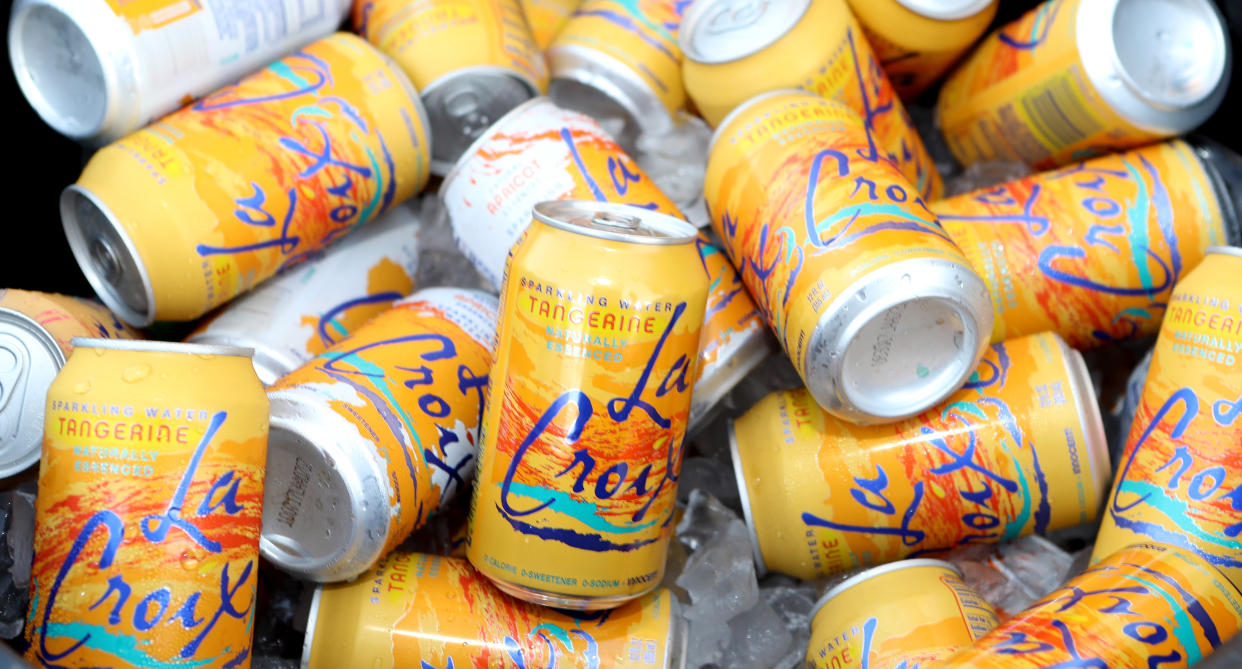People are freaking out about LaCroix's mystery ingredients — here's why you shouldn't be that worried

LaCroix fans are reeling from a lawsuit alleging that the beverage contains mystery ingredients — including one found in cockroach insecticide — despite the company’s “all-natural claims.”
According to the lawsuit filed by the Louisiana law firm Beaumont Costales on behalf of consumer Lenora Rice, LaCroix’s parent company, National Beverage Corporation, has been accused of lying about its “all natural” and “100% natural” claims — and alleges that testing reveals it contains linalool, a compound used in cockroach insecticide, among other ingredients.
“The plaintiff Rice, desiring a healthy, natural beverage, was led to purchase LaCroix sparkling water because of the claims made on its packaging, advertising and website to be ‘innocent,’ ‘naturally essenced,’ ‘all natural,’ and ‘always 100% natural,'” reads the lawsuit. “However, LaCroix, in fact, contains ingredients that have been identified by the Food and Drug Administration as synthetic. These chemicals include limonene, which can cause kidney toxicity and tumors; linalool propionate, which is used to treat cancer; and linalool, which is used in cockroach insecticide.”
The lawsuit continues “….LaCroix and National Beverage are aware of the synthetic chemicals contained in LaCroix sparking water, and yet they intentionally misled consumers into believing LaCroix all-natural in order to drive sales of the product.”
It asks LaCroix to stop “falsely labeling” its products and award damages to those who purchased the product.
Representatives from Beaumont Costales and National Beverage Corporation did not return Yahoo Lifestyle’s requests for comment. However, the latter company provided a statement on its website, which read in part:
“National Beverage Corp. (NASDAQ: FIZZ) categorically denies all allegations in a lawsuit filed today without basis in fact or law regarding the natural composition of its LaCroix sparkling waters. Natural flavors in LaCroix are derived from the natural essence oils from the named fruit used in each of the flavors. There are no sugars or artificial ingredients contained in, nor added to, those extracted flavors. All essences contained in LaCroix are certified by our suppliers to be 100% natural.”
The statement says the lawsuit provides no support for its “false” claims. “The United States Food and Drug Administration (FDA) considers ‘natural’ on a food label to be truthful and non-misleading when ‘nothing artificial or synthetic (including all color additives regardless of source) has been included in, or has been added.’ All LaCroix product labels include an ingredient statement indicating each product contains carbonated water and natural flavors. National Beverage stands by that ingredient statement and the fact that all the flavor essences in LaCroix are natural.”
So what are these mystery ingredients named in the lawsuit — and are the claims worth ditching the cultish alternative to soda?
Limonene: According to a study published in the journal Alternative Medicine Review, “D-limonene is one of the most common terpenes in nature. It is a major constituent in several citrus oils (orange, lemon, mandarin, lime, and grapefruit). D-limonene is listed in the Code of Federal Regulations as generally recognized as safe (GRAS) for a flavoring agent and can be found in common food items such as fruit juices, soft drinks, baked goods, ice cream, and pudding. D-limonene is considered to have fairly low toxicity.” It’s true that limonene was tested for carcinogens in mice and rats, per the study, and while it did increase the incidence of tumors in male rats, scientists determined that limonene poses no risk to humans.
Linalool: This flavoring additive, per Popular Science, is found in flowers and spices. “It is most definitely used in insecticides as well — that part is true,” reports the outlet. “But that doesn’t mean it’s poisonous to humans. After all, we don’t ban chocolate just because dogs can’t eat it. According to the National Institute of Health’s (NIH) PubChem, the only real toxic effects linalool has been documented to inflict on humans are mild skin and eye irritation, namely from aerosolized forms of the chemical.”
Linalool (or linalyl) propionate: According to the NIH’s Open Chemistry Database, the fragrance additive is found in ginger, as well as lavender and sage oils, and is “used in perfumery and food flavoring.”
Read more from Yahoo Lifestyle:
Food worker fired and arrested for allegedly spitting on pizza in viral video
Vaccines are the body’s secret weapon against disease — a pediatrician breaks down why
Follow us on Instagram, Facebook, and Twitter for nonstop inspiration delivered fresh to your feed, every day.

